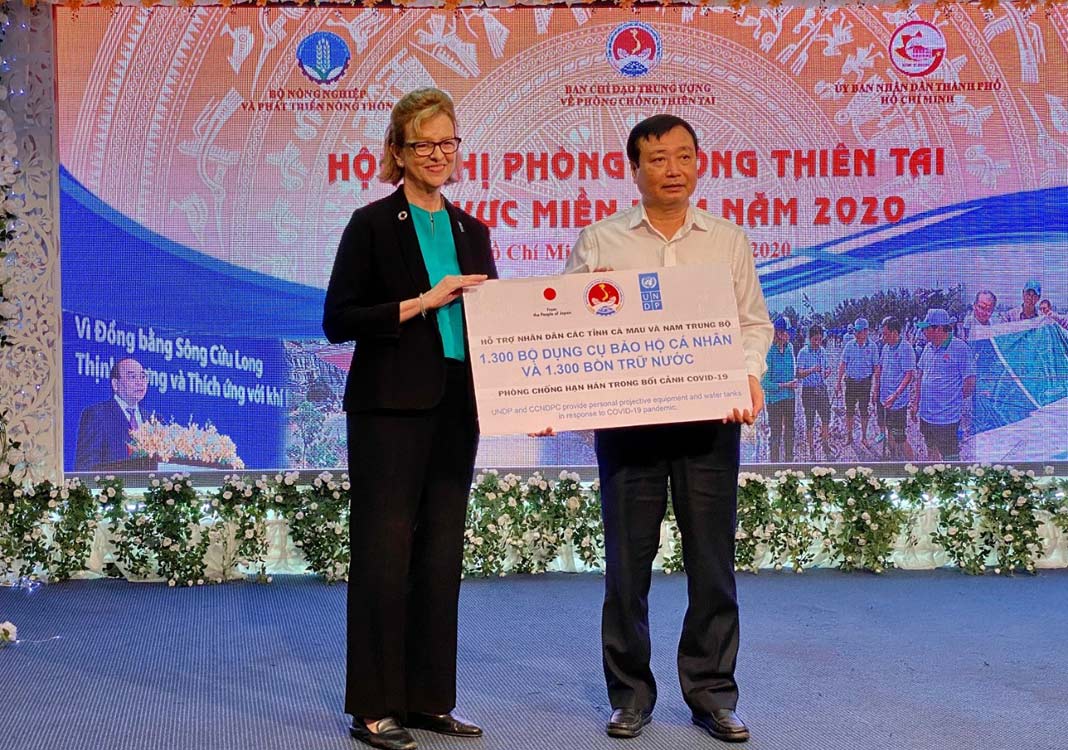HCMC – The United Nations Development Program (UNDP) and the Embassy of Japan in Hanoi announced the provision of basic support including 1,300 packages of personal protective equipment and 1,300 water tanks for the storage of clean water to poor and vulnerable households in Ninh Thuan, Binh Thuan and Ca Mau provinces to protect them against the coronavirus.
While the initiative is part of the financial support from the people of Japan under the Japan Supplementary Budget to 11 countries in Asia and the Pacific including Vietnam, UNDP is responsible for technical support and the overall management and delivery of the aid.
According to the most recent UNDP assessment over the multiple impacts of Covid-19 and drought in southern Vietnam, the poor, near-poor and vulnerable households including small farmers and informal workers are among the most affected.
For example, an average 54% of households in the provinces of Bac Lieu, Binh Thuan and Ca Mau were the hardest hit by the combined impacts of Covid-19 and drought/saltwater intrusion.
Poor households spent significantly more on water, electricity and food during the Covid-19 social distancing period and some had to sell their livestock.
As a result, the poor and near poor have a limited ability to provide for the basic needs of their families including the ability to prevent Covid-19. They lack the resources to procure equipment for water storage or hygiene that is essential for protection against the virus.
“We are delighted to work closely with the Embassy of Japan and the Government of Vietnam to provide some of the urgent Covid-19 protection needs for the vulnerable, poor people in three provinces,” said Caitlin Wiesen, Resident Representative of UNDP in Vietnam, at a conference on disaster risk reduction in southern Vietnam, held in HCMC on Monday.
She said this support is part of an integrated response to enable vulnerable households to meet their basic needs as they recover from the pandemic and ensure no one is left behind.
Coping with disaster, climate change and Covid-19
In her speech, Wiesen stressed that natural disasters are becoming more frequent and extreme due to climate change and the rising sea level. Other risks, such as epidemics, also cause compounding affects.
The UNDP has been providing technical support to the Vietnamese Government and the vulnerable communities to cope with such impacts in the southern provinces, noted Wiesen.
She stated that the increasing number of risks and disasters required adopting an integrated approach to disaster risk management in order to build the resilience of communities and the economy.
“There is a need to adopt an innovative approach to bring together different sectors to address multiple risks,” she noted.
Meanwhile, innovative risk-transfer mechanisms including insurance and the participation of the private sector are effective to enable vulnerable households and businesses to overcome the impacts of disasters. This will also help reduce the financial burden on the State budget.
“We highly encourage the Government to accelerate the introduction of risk transfer mechanisms including agriculture insurance that has already been piloted in the country and strategically engage the private sector in the reduction of disaster risk activities,” said the UNDP official.
She noted that the current recovery window provides an opportunity to make things better and the crisis can be used to rebuild infrastructure and systems that are more resilient, green and sustainable.
By Gia Phong









